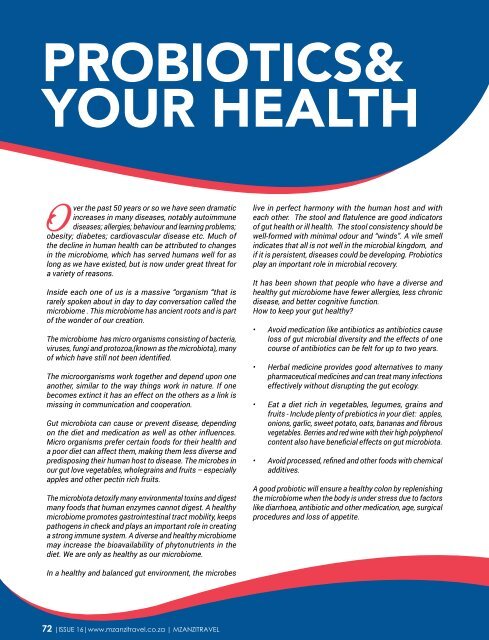MZANZI ISSUE 16
Create successful ePaper yourself
Turn your PDF publications into a flip-book with our unique Google optimized e-Paper software.
PROBIOTICS&<br />
YOUR HEALTH<br />
O<br />
ver the past 50 years or so we have seen dramatic<br />
increases in many diseases, notably autoimmune<br />
diseases; allergies; behaviour and learning problems;<br />
obesity; diabetes; cardiovascular disease etc. Much of<br />
the decline in human health can be attributed to changes<br />
in the microbiome, which has served humans well for as<br />
long as we have existed, but is now under great threat for<br />
a variety of reasons.<br />
Inside each one of us is a massive “organism “that is<br />
rarely spoken about in day to day conversation called the<br />
microbiome . This microbiome has ancient roots and is part<br />
of the wonder of our creation.<br />
The microbiome has micro organisms consisting of bacteria,<br />
viruses, fungi and protozoa,(known as the microbiota), many<br />
of which have still not been identified.<br />
The microorganisms work together and depend upon one<br />
another, similar to the way things work in nature. If one<br />
becomes extinct it has an effect on the others as a link is<br />
missing in communication and cooperation.<br />
Gut microbiota can cause or prevent disease, depending<br />
on the diet and medication as well as other influences.<br />
Micro organisms prefer certain foods for their health and<br />
a poor diet can affect them, making them less diverse and<br />
predisposing their human host to disease. The microbes in<br />
our gut love vegetables, wholegrains and fruits – especially<br />
apples and other pectin rich fruits.<br />
The microbiota detoxify many environmental toxins and digest<br />
many foods that human enzymes cannot digest. A healthy<br />
microbiome promotes gastrointestinal tract mobility, keeps<br />
pathogens in check and plays an important role in creating<br />
a strong immune system. A diverse and healthy microbiome<br />
may increase the bioavailability of phytonutrients in the<br />
diet. We are only as healthy as our microbiome.<br />
live in perfect harmony with the human host and with<br />
each other. The stool and flatulence are good indicators<br />
of gut health or ill health. The stool consistency should be<br />
well-formed with minimal odour and “winds”. A vile smell<br />
indicates that all is not well in the microbial kingdom, and<br />
if it is persistent, diseases could be developing. Probiotics<br />
play an important role in microbial recovery.<br />
It has been shown that people who have a diverse and<br />
healthy gut microbiome have fewer allergies, less chronic<br />
disease, and better cognitive function.<br />
How to keep your gut healthy?<br />
• Avoid medication like antibiotics as antibiotics cause<br />
loss of gut microbial diversity and the effects of one<br />
course of antibiotics can be felt for up to two years.<br />
• Herbal medicine provides good alternatives to many<br />
pharmaceutical medicines and can treat many infections<br />
effectively without disrupting the gut ecology.<br />
• Eat a diet rich in vegetables, legumes, grains and<br />
fruits - Include plenty of prebiotics in your diet: apples,<br />
onions, garlic, sweet potato, oats, bananas and fibrous<br />
vegetables. Berries and red wine with their high polyphenol<br />
content also have beneficial effects on gut microbiota.<br />
• Avoid processed, refined and other foods with chemical<br />
additives.<br />
A good probiotic will ensure a healthy colon by replenishing<br />
the microbiome when the body is under stress due to factors<br />
like diarrhoea, antibiotic and other medication, age, surgical<br />
procedures and loss of appetite.<br />
In a healthy and balanced gut environment, the microbes<br />
72 |<strong>ISSUE</strong> <strong>16</strong>|www.mzanzitravel.co.za | <strong>MZANZI</strong>TRAVEL
















